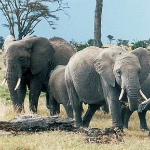Anti-poaching plan (PEXULAB) to protect elephants in ECCAS countries adopted in Yaounde16th April 2013  2012 was marked by the slaughter of elephants in the northern part of Cameroon, according to official sources, 300 elephant carcasses were found without trunks in the Cameroonian National Park of Bouba N’Djida. This horrific scene continued into the night of 14 to 15 March 2013 when close to 89 elephants in Chad and later roughly 30 elephants in Central African Republic were killed. In the face of this ecological scandal, accusing fingers point to poachers from Sudan, usually heavily armed and travelling on camel and horseback. 2012 was marked by the slaughter of elephants in the northern part of Cameroon, according to official sources, 300 elephant carcasses were found without trunks in the Cameroonian National Park of Bouba N’Djida. This horrific scene continued into the night of 14 to 15 March 2013 when close to 89 elephants in Chad and later roughly 30 elephants in Central African Republic were killed. In the face of this ecological scandal, accusing fingers point to poachers from Sudan, usually heavily armed and travelling on camel and horseback.
In response, the Economic Community of Central African States (ECCAS) ministers of foreign affairs, defense and security issues, regional integration and wildlife protection convened an extreme emergency meeting in Yaounde (Cameroon) on 23 March 2013 to adopt an Extreme Emergency Anti-Poaching Plan (PEXULAB) in the northern region of Cameroon, Chad and the northern and north-western regions of the Central African Republic and in the forest zone.
This important gathering was preceded from 21 to 23 March 2013, by a preparatory segment which attracted a large number of experts on issues of foreign affairs, defense and security, wildlife and sub regional integration. They were assisted by an assortment of diplomatic representations (Libya, Chad, USA, EU), United Nations agencies (UNESCO, FAO, PNUD/GEF, UNOPS), Cooperation agencies (UE, AFD, GIZ, USAID, USFS), national and international organizations and institutions (CEEAC, COMIFAC, RAPAC, OCFSA, TRAFFIC, CEFDHAC, UICN, WWF, SOS Eléphants, WCS, BAD, REPAR, ECOFAC V, PACEBCO, ICCN, FTNS, NEPAD, LAGA), national and international journalists from Burundi, Cameroon, Chad, RFI and Imagasine.
Over three days the high profile gathering on the fight against elephant poaching in the savanna area of ECCAS, arrived at the adoption of a PEXULAB with the overall aim of launching an emergency fight against elephant poaching in the savannah zone and the forest zone in Central Africa. Attaining this objective would be premised on an offensive and defensive approach to neutralize poachers and secure the zones concerned.
For better operationalisation of PEXULAB, participants divided the ECCAS zone into two intervention zones:
Zone A: North Cameroon, Northern and South-Western CAR and the South of Chad,
Zone B: the other zones of Central Africa.
With four strategic axes of intervention:
1) Information and security,
2) Political and diplomatic,
3) Legal,
4) Communication and awareness raising.
Given the urgency and the need for intervention, participants urged NGOs to provide logistic, technical and financial support, collect and disseminate data and information on the fight against poaching (LAB), and help in awareness raising and other activities in close conjunction with the LAB.
The meeting of Ministers of ECCAS member countries present culminated with a statement mainly calling on Ivory consuming countries on the one hand to take drastic measures to deter consumers and on the other hand, urging the poachers’ countries of origin to support affected countries in combating poaching. In addition, the ECCAS countries extended an invitation to the President of the Republic of Cameroon, His Excellency Paul Biya, to agree to be the highest authority in the sub-region, the spokesperson of the anti-poaching fight in Central Africa. In addition, ECCAS countries will mobilize up to 1,000 soldiers to initiate joint military operations to save the last surviving savannah elephants. The emergency plan with an estimated cost of 1.8 million Euros, will require air support, field vehicles, satellite phones, the establishment of a joint military command with a system of sharing and real-time analysis of information, and envisages sending a diplomatic mission to Sudan and South Sudan - the poachers’ country of origin.
Further information including statement and background documents are available from the Congo Basin Forest Partnership.
The Declaration on the fight against poaching (LAB) is also available online
|











